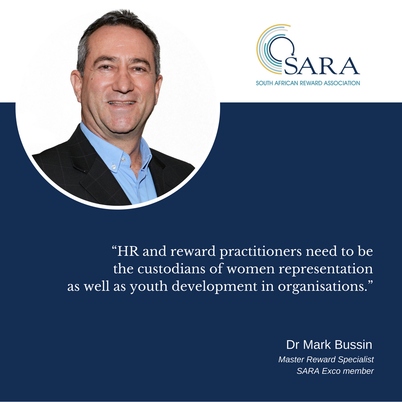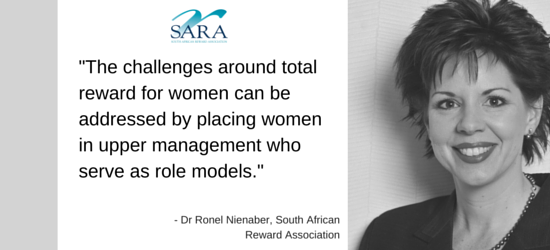|
The prosperity and equality of the nation’s workforce – alluded to in the recent State of the Nation address by President Ramaphosa – is in large part determined by reward practitioners: professionals that advise companies on how to structure financial and non-financial pay elements to compensate employees for their work.
“Inequality was mentioned at least ten times during the address,” says Dr Mark Bussin, a Master Reward Specialist, Exco member of the South African Reward Association (SARA) and Chairperson of 21st Century. “Reward practitioners must take this seriously in their practices and policies by reporting the wage gap in annual financial statements, and finding ways to close the wage gap in companies.” Tough calls for private sector reward practitioners Reward and HR practitioners also need to step up their focus on training and education. Tough calls are necessary on employing more people through internships, and creating entrepreneurs within companies. Tougher yet will be the decision to release these successful candidates to industry in order to let the larger economy benefit from the initial training and development investment. Tough calls for public sector reward practitioners HR and reward practitioners in government will be tasked with cutting costs, cutting pay increases, and managing fruitless and wasteful expenditure across the public sector workforce. “Reward practitioners need to be steady, well informed and consistent in their approach,” says Bussin. “They also need to stand up to those that resist changes for the greater good, as well as new leaders who want sweeping changes just for the sake of it.” Tough calls for individual practitioners HR and reward practitioners furthermore need to be the custodians of women representation as well as youth development in organisations. Bussin advises reward practitioners to follow national policy in all areas including benefits, working conditions and employment practices. Reward practitioners will also have the added challenge of supporting government and business in creating increased remuneration for 6 million people. The implication of this is that practitioners focus on getting their remuneration governance right and working without any further delay. “As per our President’s closing words, all reward practitioners have a chance to make a difference right where they are by moving beyond historic practices and being willing to say “send me” to do the tough work where it is necessary.” ENDS MEDIA CONTACT: Juanita Vorster, 079 523 8374, [email protected] For more information on SARA please visit: Website: www.sara.co.za Twitter: @SA_reward LinkedIn: South African Reward Association Facebook: SARA – South African Reward Association
0 Comments
It often takes a female leader to break the patterns and start the process of change, creating a culture that is progressive and aware. Businesses that adopt a progressive attitude are more likely to offer mentoring programmes that are designed to increase female career development. Gender bias and relatively fewer opportunities for women mean that often the total rewards offered aren’t one at all.
“Total rewards are defined as the combination of all types of rewards, including financial and non-financial, that are made available by employers to employees,” explains Dr Ronel Nienaber, Exco member of the South African Reward Association (SARA). “There are not enough women in leadership positions to be role models and provide others with a map to success,” says Nienaber. “Although many women achieve lower and middle management positions, they seem to hit that glass ceiling and appear to be denied the most senior levels of upper management.” Nienaber believes there are multiple reasons for this: some women lack the confidence to apply for senior positions, they are less assertive in terms of communicating career aspirations, they lack the necessary education and training and there are fewer women in leadership positions who can provide mentorship and coaching. “Also, the demands on time that come with more senior roles are often not attractive to women, or they face systemic gender bias which puts them off from fighting for top management positions,” says Nienaber. Overcoming the challenges “The challenges around total reward for women can be addressed by placing women in upper management who serve as role models,” says Nienaber. “Also, the move towards increased focus on these issues and transparency will certainly ensure more reporting is done, but whether it will eliminate gender-based pay inequalities is questionable.” “If an organisation has sufficient representation of women at senior levels, do what is necessary to bring about true change,” says Nienaber. “Conduct primary research to uncover what women’s unique needs and preferences are and work relentlessly towards implementing new policies, procedures and training/education that provide equal opportunities for men and women across all race and gender groups.” There needs to be awareness on all sides to address the problems and ignite change. Women need to understand the business environment, be confident about the challenges it presents and be authoritative when required. They have to recognise, and be true to, their own leadership styles and spend time coaching and mentoring younger women, giving them the tools they need to navigate the corporate landscape. True change requires that all types of bias are recognised and redressed, that all employees are working towards the same goal and that everyone feels empowered to reach their true potential. In a country that battles with the after effects of apartheid, employers should be actively engaging in efforts to reduce the wage gap, address fair and equal employment and ensure skills development and reward practices that will, in turn, increase return on investment and improve the organisation’s Employee Value Proposition. ENDS MEDIA CONTACT: Cathlen Fourie, 012 644 2833, [email protected], www.atthatpoint.co.za For more information on SARA please visit: Website: www.sara.co.za Twitter: @SA_reward LinkedIn: South African Reward Association Facebook: SARA – South African Reward Association  Women cannot pursue their careers with the same time and attention as their male counterparts. This is evident in that despite women being equally qualified, only 4% of the CEOs of Fortune 1000 companies are female and 22 out of 197 global heads of state are women. It thus stands to reason that total rewards have to be re-examined within the unique circumstances facing the female employee and not just tailored to the traditional gender set-up that has gone before. “Total rewards are defined as the combination of all types of rewards, including financial and non-financial, direct and indirect, intrinsic and extrinsic, that are made available by employers to employees in terms of the adopted reward philosophy, strategy and framework,” explains Dr Ronel Nienaber, Exco member of the South African Reward Association (SARA). “A well designed total rewards model is proven to improve employee commitment and engagement and retention, assists in the reinforcement of organisational values and culture and forms a key cornerstone of the Employee Value Proposition.” “The challenges women face in breaking through glass ceilings often emanate from traditional gender hierarchies and norms that prevail in the family and society,” says Nienaber. “Despite gender equality and empowerment, the household unit often still has a traditional structure that makes males the dominant gender; these traditional stereotyped role expectations spill over to organisational policies and practices and become entrenched in a gender-biased organisational culture that is very difficult to break.” “I believe that the total reward systems in South Africa and globally are not flexible enough to address the specific needs that women have,” says Nienaber. “In most households, women are the primary caregivers for children and elderly relatives. How can women then still pursue their careers with the same time and attention as their male counterparts?” Nienaber believes that businesses that adopt a progressive attitude are more likely to offer flexible work schedules to help accommodate the needs of working women and offer mentoring programmes that are designed to increase their career development. Employers need to offer child care facilities as a standard alongside flexible time and leave programmes that will allow women more time to focus on their careers. “Total reward forms an inherent part of the dynamic relationship between the employer and the employee and incorporates the elements used by the former to attract and retain the latter,” Nienader says. “Employers should be actively engaging in efforts to reduce the wage gap, address fair and equal employment and ensure skills development and reward practices that will, in turn, increase return on investment and improve the organisation’s Employee Value Proposition.” ENDS MEDIA CONTACT: Cathlen Fourie, 012 644 2833, [email protected], www.atthatpoint.co.za For more information on SARA please visit: Website: www.sara.co.za Twitter: @SA_reward LinkedIn: South African Reward Association Facebook: SARA – South African Reward Association |
Archives
March 2023
Welcome to the South African Reward Association newsroom.
Categories
All
|



 RSS Feed
RSS Feed